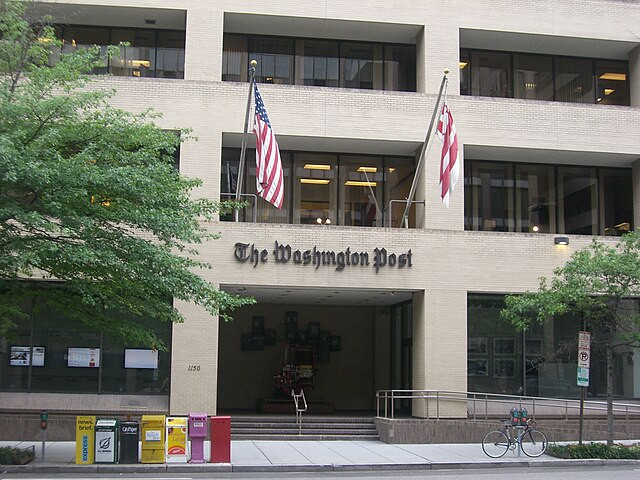Amazon founder Jeff Bezos overruled his own publisher to prevent The Washington Post from endorsing Vice President Kamala Harris in the 2024 presidential election. The decision, which has ignited widespread backlash within the newspaper, marks the first time in decades that the Post will not endorse a presidential candidate, setting off alarm bells among its editorial team and longtime observers of the institution.
Sources close to the matter revealed that Will Lewis, the publisher of The Washington Post who was handpicked by Bezos, strongly opposed Bezos' intervention but was ultimately overruled. Despite his public statement justifying the decision as a return to the Post's tradition of non-endorsement, Lewis reportedly fought "tooth and nail" to uphold the planned endorsement for Harris.
The internal uproar has been significant. Eight senior opinion columnists, including Pulitzer Prize winners, publicly denounced the decision in a joint statement, calling it "a terrible mistake." They argued that Bezos' decision amounted to an abdication of the newspaper's editorial responsibility, particularly at a moment when, as they wrote, "one candidate is advocating positions that directly threaten freedom of the press and the values of the Constitution."
The tension within The Washington Post echoes larger concerns about the influence of billionaire owners on the media. Jeff Bezos, who purchased the paper in 2013, has often been credited with reinvigorating the Post's business model through digital subscriptions and expanded content. However, this latest intervention has raised questions about how far that influence extends into the editorial independence of the paper.
Washington Post staff are resigning in protest to Jeff Bezos stopping the newspaper endorsing Kamala Harris.
Thousands of subscribers have also shared that they have unsubscribed from the newspaper.
Whats your reaction? pic.twitter.com/RO3f5EgXlq — Oli London (@OliLondonTV) October 25, 2024
In a statement explaining the decision, Lewis said that The Washington Post would no longer endorse presidential candidates, aligning with what he described as a return to the paper's roots. "We are returning to our roots of not endorsing presidential candidates. The Washington Post will not be making an endorsement of a presidential candidate in this election. Nor in any future presidential election," Lewis wrote. "We recognize that this will be read in a range of ways, including as a tacit endorsement of one candidate or as a condemnation of another, but we don't see it that way. We see it as consistent with the values The Post has always stood for."
The decision, however, has been met with fierce criticism, especially given the timing. With only days left before the election, many in the newsroom argue that now is not the moment for neutrality. Legendary reporters Bob Woodward and Carl Bernstein issued a statement calling the decision a "grave error" and a disservice to the paper's long-standing journalistic mission. Pulitzer-Prize winning journalist David Maraniss described it as "contemptible," adding that it demonstrated a lack of courage in the face of an unprecedented threat to democracy.
The tension stems from the Post's long history of endorsing candidates, especially during high-stakes elections. The paper endorsed Hillary Clinton in 2016 and Joe Biden in 2020, citing the dangers posed by then-President Donald Trump. In their joint statement, the Post columnists emphasized that this election was even more consequential, with Trump's potential return to the White House representing a direct threat to the press and democratic norms. "An independent newspaper might someday choose to back away from making presidential endorsements," the columnists wrote. "But this isn't the right moment."
Among those most vocally opposed to Bezos' decision is Robert Kagan, a prominent columnist and editor-at-large at the Post, who resigned in protest. Speaking to CNN, Kagan suggested that Bezos' decision was politically motivated, speculating that the Amazon founder was attempting to curry favor with Trump in anticipation of his potential reelection. Kagan argued that Trump had long been a vocal critic of Bezos and Amazon, particularly during his first term, when the Trump administration blocked a $10 billion Pentagon cloud contract that Amazon had bid for.
Kagan's assertion that Bezos is trying to avoid further attacks from Trump was echoed by other critics. Marty Baron, the former executive editor of the Post who led the paper through its Pulitzer-winning coverage of the January 6, 2021, Capitol attack, wrote on social media, "This is cowardice, with democracy as its casualty. Donald Trump will see this as an invitation to further intimidate owner Bezos (and others)."
The decision by Bezos has also resulted in a backlash among the Post's readership. Prominent progressive activists and longtime subscribers took to social media to announce they were canceling their subscriptions. Many argued that the Post had a responsibility to take a stand, especially given its role in Washington, D.C., as a national newspaper with substantial influence on political discourse.
While the Post is not the only media outlet to scale back its political endorsements in recent years, the decision has particularly resonated in a climate where many see American democracy under threat. Other major newspapers, including The New York Times and The Philadelphia Inquirer, have continued the tradition of endorsing candidates. On Friday, the Inquirer endorsed Kamala Harris, stating that "America deserves much more than an aspiring autocrat who ignores the law."






